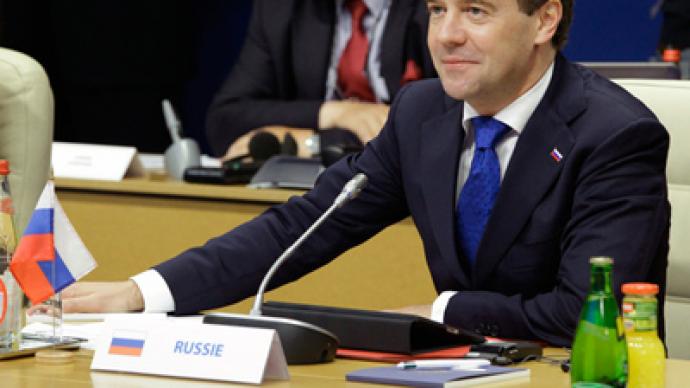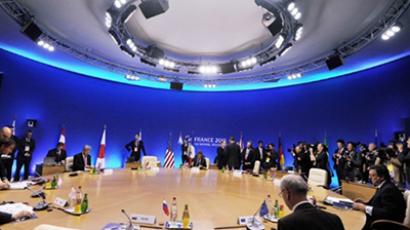Medvedev warns of arms race by 2020 without agreement on missile defense

In a press conference following the conclusion of the G-8 Summit in Deauville, France, President Dmitry Medvedev discussed Russia’s response to missile defense talks with the US.
On the critical subject of missile defense, which threatens to create a return to Cold-War conditions for the European continent, not to mention US-Russian relations, Medvedev expressed his dissatisfaction with the result of the talks."I am not satisfied with the American side's reaction to my proposals and with NATO's reaction in general,” the Russian leader told reporters on Friday at the resort town of Deauville. “Why? Because we are wasting time. Even though I spoke about the year 2020 yesterday as a deadline…which is the year when the construction of a four-stage system of the so-called adaptive approach ends." "After 2020, if we do not come to terms, a real arms race will begin," Medvedev warned.The Russian leader stressed that he has received no satisfactory guarantees that the missile defense shield is not being targeted at Russia.“When we ask for the name of the countries that the shield is aimed at, we get silence,” he said. “When we ask if the country has missiles (that could be aimed at Europe), the answer is 'no.'”“Now who has those type of missiles (that the missile defense system could work against)?” “We do,” Medvedev explained. “So we can only think that this system is being aimed against us.”Moscow has stated on many occasions in the past that without Russia's full participation in the missile defense project, an arms race could break out once again on the European continent.The Russian president said that he would not look forward to living on such a continent that has reverted back to an arms race. US President Barack Obama upon entering office made a "reset" in relations with Russia a primary goal of his administration. Much to Moscow's satisfaction, the Democratic leader "scrapped" the Bush plan for missile defense, which called for land-based missile systems and sophisticated radar on the territories of Poland and the Czech Republic.The new Obama plan, however, which relies on sea-based interceptors, has proven to be no less threatening to Russia's national security, Moscow argues, unless Russian technicians are permitted a hand in the developmental and operational stages of the program.Thus far, this has not happened.Libya MediationMedvedev then gave a clear signal of Russia's position on the ongoing Libyan conflict, which has witnessed an escalation of NATO aerial bombardments over the last 24 hours.Stressing that Russia has kept open the lines of communication between both the anti-government opposition and the supporters of Muammar Gaddafi, the Libyan strongman who has been in power for 42 years, Medvedev said that neverthless "the Gaddafi regime has lost its legitimacy.""Gaddafi must step down," Medvedev told the press conference.The Russian leader then stressed that "as soon as we put an end to the military operations, the better it will be for the Libyan people."Medvedev added that the Summit leaders agreed that Russia was the "most qualified" to head mediation talks due to its middle-of-the-road position in the conflict.Russia abstained from voting on a resolution in the UN Security Council that opened the door to military intervention in the country with the goal of protecting civilians.Yet Moscow in the past has warned that the alliance went beyond the parameters of the resolution.Medvedev said Russia would be sending Special Representative for Africa Mikhail Margelov to Benghazi to facilitate the Libyan peace talks."He will go there immediately," the president said. "In order to use our potential and contacts Russia has with Benghazi, on one hand, and with Tripoli, on the other hand.When asked if Russia would be willing to grant political asylum to Gaddafi, Medvedev said that was not an option."We won't do that," he said. "However, some other countries will. Let him go where he wants to."On the Terror FrontMeanwhile, Medvedev welcomed the readiness of the United States in helping to catch Doku Umarov, the leader of North Caucasian militants.The US realizes that international terrorism does not have borders and "members of the self-same terrorist network which Americans are fighting against are in fact operating in our Caucasus," Medvedev told the press conference."This means that the Americans are ready to join the effort, and we are glad because the US has its own possibilities in this sphere and its own expertise," he said. "If in the long run this is going to help to catch or eliminate Umarov, let it be so. This is the result which should be welcomed."Medvedev then said Russia welcomed the elimination of Osama bin Laden, which the US says was responsible for the terror act of 9/11. "For this very reason, Russia welcomed the elimination of al-Qaeda leader Osama bin Laden. For this very reason, such agreements are possible today," Medvedev concluded.Japan and future of nuclear powerPresident Medvedev then discussed talks that he had on the sidelines of the summit with Japanese Prime Minister Naoto Kan, whose nation is still reeling after a devastating 9.0 earthquake triggered a tsunami that inundated the northeast section of Japan. The two leaders discussed the question of nuclear energy safety, which is of particular interest following a nuclear accident at the Fukushima Nuclear Plant that was triggered by the tsunami on April 11."No one has managed to name an alternative that could replace nuclear energy today," Medvedev told the press conference.No sanctions for SyriaRussia does not favor sanctions against Syria, which is presently involved in a government standoff with anti-government forces, but Syrian President Bashar al-Assad must ensure democratic transformations, President Dmitry Medvedev said."I had a telephone conversation with Syrian President Bashar al-Assad about two days ago. We do not favor sanctions. We think that President al-Assad must pass from words to deeds and really hold democratic transformations in his country: to give the voting right to the opposition, to amend election laws and to prevent violence in opposition actions," he said.Robert Bridge, RT














